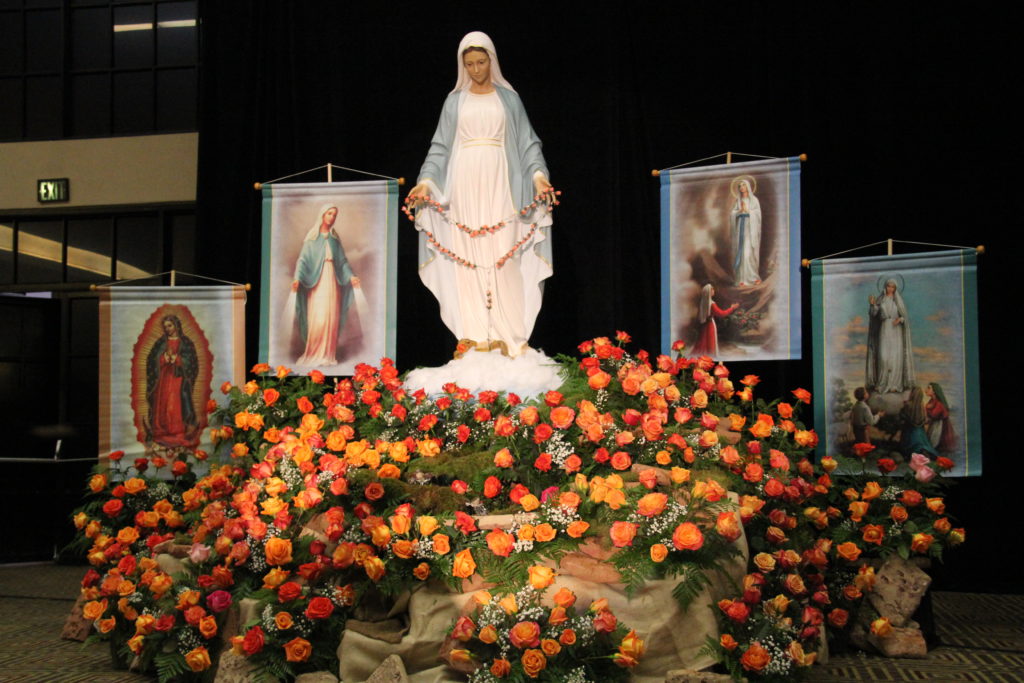
SCOTTSDALE — Fr. Don Calloway, MIC had a message for the more than 1,100 people who packed into the DoubleTree Resort Aug. 21-23 for a three-day Marian Conference.
“We need Our Lady in a big way, probably more than we’ve ever needed her before.”
He referred to “so-called gay marriage” and the series of recent videos casting light on the trafficking of unborn body parts by employees of Planned Parenthood, calling the organization “a bastion of evil, it is a place of darkness and death.” He also praised the effort that saw over 300 protests earlier that morning against Planned Parenthood.
Fr. Calloway, renown for his conversion story, also referred to the upcoming presidential election, the Gospel call to love your neighbor and Christ’s words on the final judgment adapted for our times.
“If you pray, you can really hear it coming from the heart of Christ, through His Church, ‘I was in the womb and did you defend Me? When you cast your ballot, where were you?’”
The 15th Arizona Marian Conference organized by the Arizona Peace Center was themed, “At Every Moment Do What Love Requires,” and drew participants from 20 states.
“It’s not easy to do what love requires,” wrote Bishop Thomas J. Olmsted in a letter featured on the inside cover of a program guide for the conference. “To follow in the way of Jesus there is no better guide for us than Our Blessed Mother.”
Attendees left inspired to grow closer to the Queen of the Universe through a series of talks. They also took advantage of prayer opportunities via the rosary, the Divine Mercy chaplet, time in the Eucharistic adoration chapel and daily Mass.
Fr. Bill Casey, EWTN contributor and superior general of the Fathers of Mercy, tied the conference’s theme to the action of fraternal correction saying the practice is sometimes a “strict obligation in love, in charity,” and not to be afraid in doing so.
Fraternal correction, rooted in Scripture, is the practice of calling a neighbor’s attention to sinful behavior with the purpose of reform.
“The greatest love of all is concern for your neighbor’s eternal salvation,” he said.
He pointed to St. Thomas Aquinas’ three general rules of fraternal correction: that it should be done privately, in charity and infrequently.
Fr. Dwight Longenecker, a Catholic blogger and former Episcopalian priest, spoke on the Rosary as a vehicle for inner healing. He shared about Christ “doing His healing work,” on areas of one’s life that match up with praying the mysteries of the Rosary.
“While you’re praying the Holy Rosary, He’s using the deeper aspects of those mysteries to go down and heal those areas of your life that need healing,” said Fr. Longenecker, referring to “Dr. Jesus” and “Nurse Mary.”
Catholic radio personality Christine Watkins reminded conference-goers on the power of Reconciliation, saying, “every time we go, we are healed and strengthened.”
“Our weak areas become stronger, our temptations lessened. There are even physical, psychological and emotional healings that can happen in the sacrament of reconciliation.”
She offered a test when tempted to rationalize sinful behavior with excuses that protect the ego, but not the soul: take a crucifix, face it and give an excuse (or explanation) aloud to Jesus on the cross.
“If what we’re saying is true, He will bless us back with our own words and say to our hearts. ‘Yes, what you’re saying is true, be at peace,’” Watkins said. But if not, one could feel foolish, uncomfortable or doubtful.
“God wants us to be free from our excuses, so we can just be, happy — free from our sins, not have them buried within our souls; joyful in this life and exceedingly ecstatic in the next, that is the goal for us,” said Watkins.
Conference volunteer Joseph Elvig, 20, a junior at Arizona State University, drew lessons from the presentations.
Elvig said “what spoke to my heart the most was that God is calling me to have a deeper relationship with the Blessed Virgin and to get to know our Mother more and have a personal relationship with her.”







